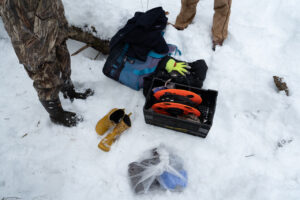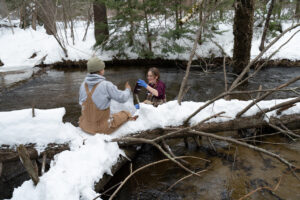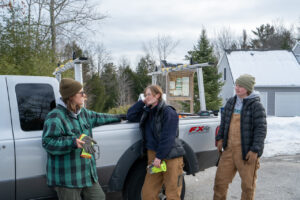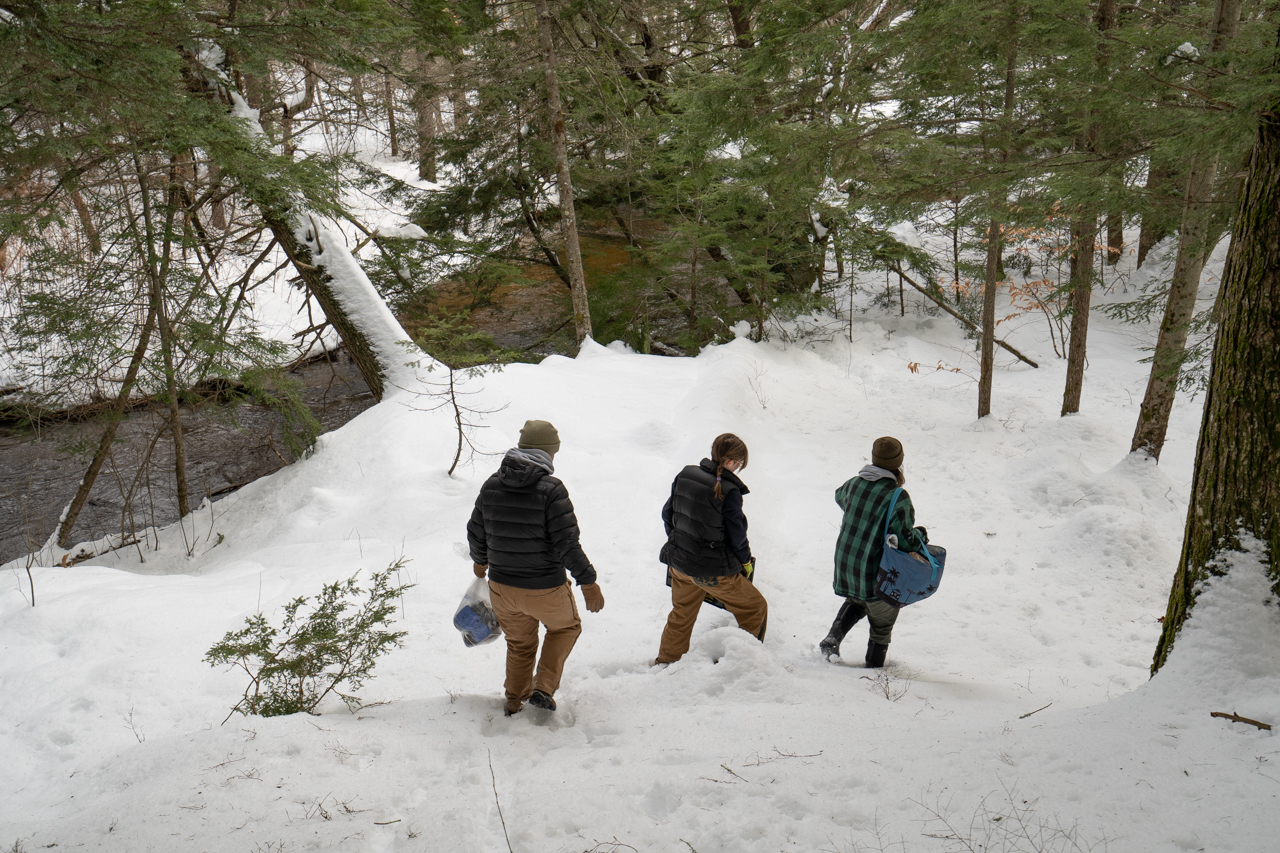Thomas Grebouski, Contributor
Despite being tasked with having a hand in saving the world, our peers in the sciences don’t wear capes. They wear pants, and they put them on one leg at a time like the rest of us. One difference is that sometimes those pants are waterproof waders, and we find our main character standing waist deep in a thirty-four degree river taking water samples. This happened a few weeks ago, and I had the pleasure of tagging along, with the added benefit of staying dry. We will circle back to that.

The life of a biology major is plenty relatable to most of us: late nights studying, dense textbooks, quizzes and tests, trying to maintain a semblance of self care as best we can, and maybe, just maybe, finding some time to go out and take a hike before swinging by Three Dollar Dewey’s on our way back into town, just to let the semester slip from our minds for an evening.
Enter my friend Grace, a 24-year-old Junior here at USM. Grace uses they/them pronouns, and their reasons for this are that a binary system fails to capture the complexity of human existence and experience. Grace would describe themself as a person first and foremost. I would add that they are a person with a zest for life and a clear passion for their chosen field. Grace’s day starts around 7 a.m. each day. With a job on top of a hefty course load and some difficult classes, tending to the foundations of mental and physical health are critical for keeping up. Morning meditation and a good breakfast are a fruitful way to start the day off on the right foot. Grace then arrives at school around 9 a.m. and finds somewhere cozy to study, do homework, or write lab reports. “I also take little power naps in the daytime or make myself tea and get up and stretch a lot while studying. So I haven’t cracked yet, but we’re only three weeks in.” Self care is important y’all, don’t let the Protestant Work Ethic make you feel guilty for resting. From there, it’s classes and labs with a few study breaks interspersed throughout.
The days can easily turn into 12 hours of work. After getting home around six to make up a quick dinner and wash the day off in the shower– “one that is approximately the temperature that I think Satan himself would maybe take a shower at,” according to Grace– next comes the evening’s task list. A quiz or assignment due by midnight is a common occurrence, and Grace has, on many occasions, spent the last few waking hours finishing it. We’ve all been there: it’s the feeling of any typical action movie where the main character does the home-run slide under a closing security gate at the last moment. Tell me it’s not just me, right?
Pathophysiology is Grace’s most challenging course this semester. It is the study of what goes wrong, when things do go wrong, with a human body. “I’ve never had a class that’s so fast paced,” they say. “I’m learning an astonishing amount, which is great, but it is like trying to sip water out of a firehose.” It’s one of those classes that expects a lot of prerequisite knowledge which students don’t always have. In this case, students are expected to have a working knowledge of anatomy because the course is also offered to nursing students. As a biology major, Grace is working overtime to catch up on that end. Seldom can we predict what our hardest class will be in a given semester, and any way you slice it, being a full time STEM major on top of working to upkeep an apartment in town is a lot and then some.

As a lay person, when I think of biology, I think of studying plants and cells and the phrase Mitochondria is the powerhouse of the cell comes to mind reflexively from my high school days. To make matters worse, I also imagine that everything is done with microscopes while wearing white lab coats. So I asked Grace how they would describe the overarching theme of what they are learning. Here’s what I got:
“I’m learning what makes the universe tick.”
To which I replied, “some might say that’s physics.”
To which Grace retorted, “some might say kiss my a** Thomas. What I am learning and why I study bio is that even the most simple thing in nature is actually incredibly complex and really beautiful. You just have to take the time to learn about those mechanisms and you can have your mind blown.”
Grace came to study biology through a sort of happenstance. Like many of us, Grace has changed majors a few times now. The pandemic had forced them to come home from a study abroad in Ireland, and on a whim, with not much else to do, Grace enrolled in an upper-level biology course. Despite being worried that it would be too difficult to jump in, what they found instead was a topic they became obsessed with. It was hard work, no doubt, but the kind of glimpse into a world of intrigue that one keeps showing up for. Citing the complexity, wonder, beauty, even the improbability of life itself, Grace sees biology as a comfort: “It made me cool with being alive. Sometimes life is hard, but sometimes things are so fascinating and beautiful that you’ve got to stick around and learn more about it.” It is perhaps as the French chemist Louis Pasteur once noted, that a little bit of science may estrange a person from a god (or spirituality, a sense of wonder, whatever your cup of tea may be), but a lot of science brings one back to those deeply human feelings of awe.
Remarking that I find science exciting, Grace recounts to me the most boring experience they can, which was the time they spent a whole day staring into a microscope counting every little organism in slide after slide of pond water. It can’t be all fun and games, and you’ve got to get through the hard parts to enjoy the good parts. Such is life. Part of Grace’s work is interning with Sharon Mann, a doctoral candidate here at USM. Mann’s work involves the sampling index sites. These index sites are used to take a snapshot of water quality and identify the organisms and background DNA in the water (referred to as eDNA, the “e” being “environmental”). Taking these snapshot samples once a month enables scientists to see changes in the environment over time. Gathering the samples is a bit of a frigid experience in the winter however. After a short walk in the snow, someone needs to wade into the middle of the river with empty bottles for sampling. It was at this point I thought, surely there was some oversight –a joke perhaps… the middle of this freezing river? Why not grab a sample from the shore? As it turns out, the middle of the river offers the cleanest and most consistent sample, and this type of small detail adds up to the best sets of data that our scientists can gather. After sampling comes the tedious work of filtering, extracting, and processing the eDNA. If I were swimming upstream while the samples were taken, there is a good chance they would have noticed back at the lab. This eDNA stuff is everywhere though, not just in bodies of water, but on the ground and in the air. It provides a great insight into what kinds of life are around us, how much of it, and if measured over time, any changes that are taking place.
Tasked with saving the world, as I mentioned up front, is not all it seems to be. The truth of the matter, in broad strokes, is that our younger generations mostly wish they didn’t have to, or at least that we weren’t so seemingly alone in shouldering the burden. Burnout and desperation creep in sooner or later for anyone who dares to care. Grace offered some wisdom for this situation: “For a long time I was all about saving the world, and that sort of just crushed my mental health and my spirit. I’m in the process of trying to rebuild that. I realized that sometimes the way to make the world a better place is to make yourself a better person.” Of course Grace remains keen about environmental issues, being especially attuned to noticing the changes happening around us. At the end of the day, none of us can do our best work, never mind save the world, if we don’t take care of ourselves first.
Grace grew up in a small rural town about 30 minutes from Portland. They have roots here in the city too; some buildings (even one on campus) bear the name of their ancestors. “My dad’s side of the family lived here for many generations and it’s cool to walk down the street… seeing the names of my family… or to walk around knowing that my ancestors were walking the same streets and studying some of the same things. It makes me feel a connection to the people that came before me,” they explain. Grace goes on to describe some of the things that I think draw many of us to the city: “I like Portland, I love that there’s no parking and my rent is exorbitant and that my neighbors drop cinder blocks. No, I do like Portland, it’s walkable, everything feels accessible, and I love the old architecture. I’m just a sucker for an old building or a weathered shingle.”
When it comes to the school itself, Grace sees a great benefit in the non-traditional students that we have at USM. “They have so much more life experience to add, and it’s nice to be around other old farts.” A gripe however, is the Presidential Scholarship. For Grace, the Presidential Scholarship was a big factor in going to school and making it affordable, but “they required me to take a minimum of 15 credits every single semester, and I was f****** dying under that course load. I barely retained any information from any of those classes. And as an extra slap in the face, they have, as of this year, repealed that requirement because they realized everyone was struggling.” Grace likely has a point: USM is often a stepping stone for people to get a foot in the door of higher education. But the school’s six-year graduation rates are nothing to boast about. According to a recent “Message from President Edmondson” email that went around, “for the entering class of 2015 [the six-year graduation rate] is 27.6% for men and 39.4% for women,” and this statistic is disproportionately affected by non-traditional students. Motivating students to keep up a 15 credit per semester workload may have helped graduation rates. Or it may have backfired. As an added slap in the face, to borrow Grace’s expression, the original 15 credit requirement was not intended to be punitive, and thus was seldom enforced in the first place. On top of that, the Presidential Scholarship is only available for a set number of consecutive semesters, and does not easily give extensions for extenuating circumstances that cause people to take a year off. Grace will be able to finish their biology degree, but has had to make up that funding elsewhere.
In wrapping things up, I asked for a fun fact. I was informed that stinging nettle, a plant native to Maine, is rather Metal in its conduct. The plant creates silica, a sort of glass like substance, and when you brush up against it the silica scratches the skin. At the same time, vacuoles of histamine are bursting and being rubbed into these tiny wounds causing an allergic reaction of burning and itching. As Grace puts it, “have some broken glass, and then we’re going to wipe histamine all over you. Yeah, it’s pretty aggressive. I think it’s hysterical.” It’s nasty and it’s mean, but yet, if you boil the leaves this all breaks down and the nettle turns out to be quite a healthy snack. One wonders what type of person discovers these things.

Grace has plans for their biology degree, no doubt. Personally, they plan to be in constant wonder at the world. Professionally, they plan to “make a buttload of money doing something I can stand doing until I can’t stand it anymore,” at which point they will live out a common fantasy involving a house with turrets, a library, and a huge garden (expertly cared for, I suspect). Overall, Grace has found their niche; their passion shows, and I have no doubt that they will go far in their chosen field. For some of us, we settle on a career path that at least affords us the ability to do what we enjoy in our free time. So be it. Here’s to all the bio majors, wishing them godspeed and great success.
P.S. write to us – what’s your hardest class and why?
Write to us on Facebook or Twitter at USMFreePress, or leave me a voicemail at 207.251.0323

